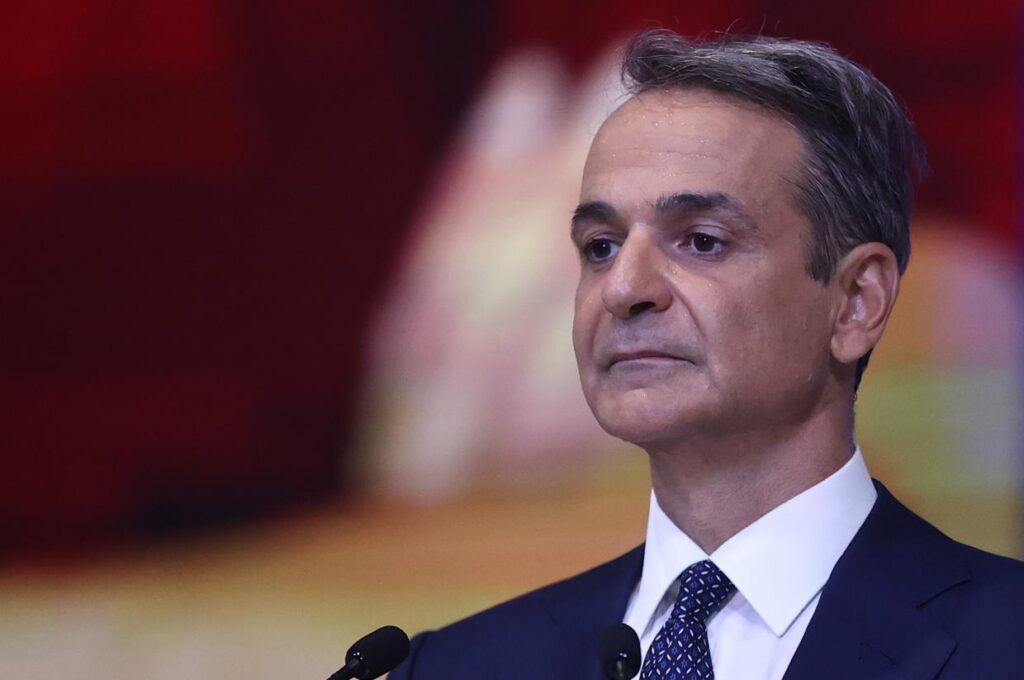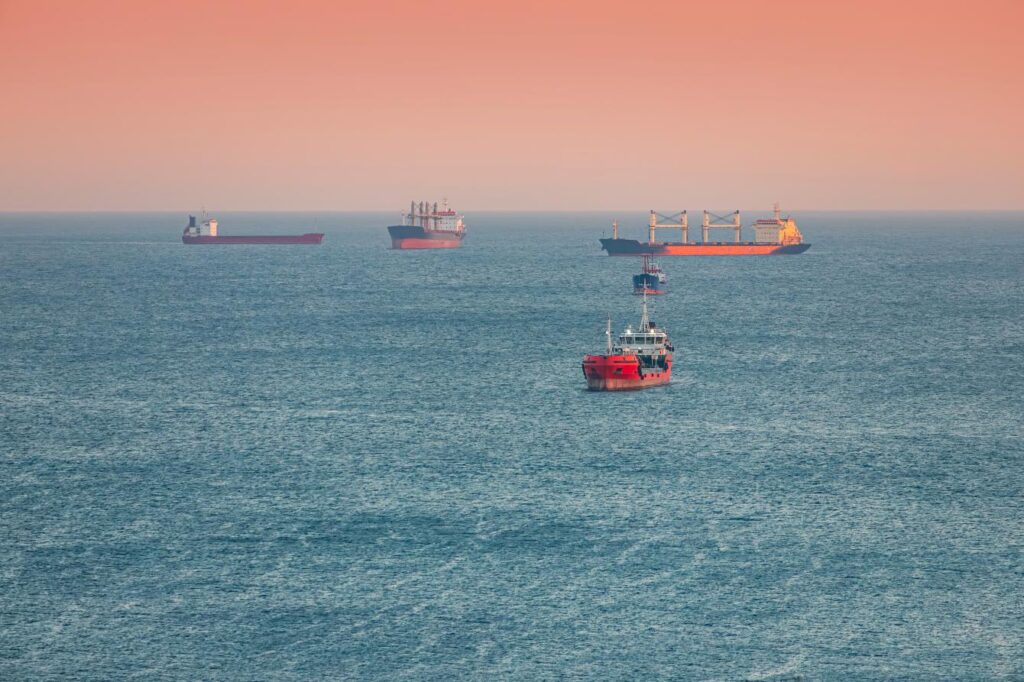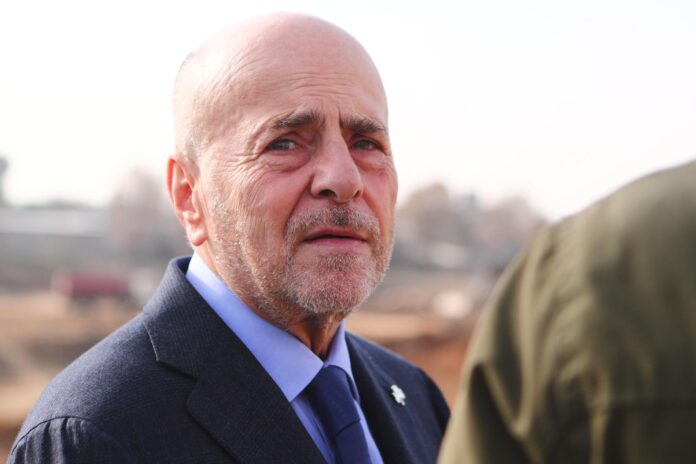The Shadow Fleet, the Interception in France, and the Revelations About What Alafouzos Is Doing. How his companies are involved in the transport of Russian oil, what Periodista.gr first revealed, and why the Mitsotakis government is being exposed internationally
Periodista
The case of the “shadow fleet” and the interception of the tanker Pushpa/Boracay by the French authorities off Saint-Nazaire could not have more clearly highlighted the problem: powerful business interests within the EU — among them the shipping companies linked to the Alafouzos family — are involved in the transport of Russian oil.
According to reports in international and Greek media, Okeanis Eco Tankers and Kyklades Maritime continued to transport Russian oil under the G7 price cap, insisting that they comply with the rules. However, the issue is not only legal. It is political and deeply moral: how is it possible that the companies controlled by one of the most powerful media owners in the country — Giannis Alafouzos, in this case — are being internationally accused of facilitating Moscow’s exports at the same time that the Mitsotakis government ardently supports the sanctions?
Periodista.gr Was the First to Reveal It
It is not the first time that this issue has come to light. Periodista.gr had revealed months earlier the involvement of the Alafouzos group in the transport of Russian oil.

What was happening — and what is still happening — beyond the legal involvement, at the political level? On the one hand, there is pro-government and pro-Ukrainian propaganda of the worst kind through SKAI, and on the other, profits from the transport of Russian oil.
The current developments — with the French authorities’ operation and the strengthening of EU sanctions — simply confirm what Periodista.gr had already pointed out.
The EU Context and European Pressure
The interception of the tanker off Saint-Nazaire is not an isolated incident. It marks the EU’s shift from theoretical lists to the enforcement of measures at sea, based on irregularities in flags and incomplete documents. French President Emmanuel Macron himself supported the operation.
At the same time, Lithuanian MEP Petras Auštrevičius revealed that he had addressed Kyriakos Mitsotakis, asking that Greek-owned ships be prevented from joining the shadow fleet.
“We were assured that the situation was under control,” he told EU Today. “However, the facts have shown that we were given misleading information.”
“Together with my colleagues in the European Parliament, we appealed to Kyriakos Mitsotakis, the Prime Minister of Greece. We urged him and his government to prevent Greek-owned ships from ending up in Russia’s shadow fleet. We were assured that the situation was under control,” the Lithuanian MEP told EU Today. “However, the facts showed that we were given misleading information. It is crucial to address the issue of limiting the activity of private shipowners, since the shadow fleet constitutes a threat not only to Ukraine, by supporting Russia’s war machine, but also to the rest of Europe through hybrid operations against us,” the MEP concluded.

This statement is a blow to the government, which appears to be concealing the truth, leaving the actions of private shipowners unchecked.
The 2024–25 Investigations and Greek Primacy
Independent investigations by media and NGOs in 2024–25 recorded sales of aging tankers worth 6.3 billion dollars to opaque buyers who were linked to transactions with Russia. Greek, British, and German sellers ranked at the top.
A second investigation focused on 14 former Greek-owned ships that ended up in the shadow fleet, with a total value of about 480 million dollars, naming specific companies as sellers.
The Truth Behind the “Price Cap”
As prices changed in 2025, Greek shipowners returned to transactions within the G7 price cap, citing “compliance.” Reuters reported increased loadings of Urals crude when prices fell below the threshold, while Greek fleets expect to continue the transports.
However, the “legal” framework blurs the picture: the same companies that appear to be acting lawfully have been involved in transactions that undermine the essence of the sanctions.
International Lists and the Role of Oikonomou
According to foreign media reports, Ukraine’s National Agency on Corruption Prevention (NACP) in 2023 had included several companies in the list of “International Sponsors of War,” among them companies linked to shipowner George Oikonomou. Denials were published in the press, but the evidence remains and shows the Greek predominance in the shadow fleet.
Several companies with Greek ties have been named by media and civil society for previous involvement in transactions related to Russia, while they themselves dispute any violation of sanctions.
European media today report that coverage in Greek outlets and websites has claimed that Okeanis Eco Tankers and Kyklades Maritime — companies connected to the Alafouzos family — continued to transport Russian oil under the price cap.
The New Sanctions Package and the “Loopholes”
The EU, with its 17th and 18th sanctions packages, listed nearly 200 new ships, introduced port bans, and strengthened monitoring of dark activities such as ship-to-ship transfers.
The major pending issue, however, is whether the Commission will proceed with targeted sanctions against natural and legal persons within the EU. If that happens, then the name of Alafouzos and his companies will inevitably be at the center.

At a regulatory level, the EU has gradually shifted from general embargoes to targeted maritime measures.
The 17th package (May 20, 2025) listed nearly 200 additional ships connected to the shadow fleet and expanded tools against circumvention.
The 18th package (July 18, 2025) added further ship listings and supplementary restrictions, building on previous actions. This framework allows for port and service bans and clarifies the evidentiary pathways for future listings.
Enforcement priorities now focus on three pressure points:
- The integrity of documents and flags, given the frequent identity changes within the shadow fleet.
- The quality of attestations under the price cap, where false statements and multi-layered intermediaries create weak points.
- Ship-to-ship transfers and patterns of dark activity that conceal origin and destination.
Targeted inspections in EU waters — supported by EMSA intelligence — are expected to focus on these areas. Two pending policy issues arise for the Commission and the Council:
Will the EU examine targeted listings of natural and legal persons within the Union when there is evidence of knowingly facilitating shadow fleet operations, complementing the measures at the vessel level?
And how will enforcement be strengthened around the price cap certification system and high-risk practices such as undeclared ship-to-ship transfers, frequent flag changes, and opaque ownership chains?
Clear answers will determine whether the next phase will focus on closing remaining compliance gaps or on imposing sanctions on domestic facilitators who exceed legal limits.
The Biggest Scandal in Greek Shipping
The shadow fleet case is the biggest scandal in Greek shipping in recent years. And the involvement of the Alafouzos group, which has been highlighted for months by Periodista.gr, reveals absolute cynicism: the shipowner–media magnate supports the Mitsotakis government in communication terms, while at the same time his shipping companies appear to be facilitating Russia.
